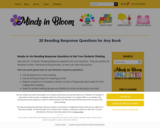
Generic questions to respond to any work of literature.
- Subject:
- English Language Arts
- Material Type:
- Activity/Lab
- Author:
- Rachel Lynette
- Date Added:
- 04/06/2020

Generic questions to respond to any work of literature.

Build number sense...have fun!
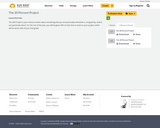
The 20% Project is your chance to learn about something that you are personally interested in, intrigued by, and/or are passionate about. For the rest of the year, you will be given 20% of class time to work on your project, which will be worth 20% of your final grade.
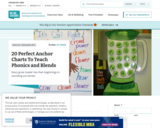
Phonics charts and blends charts are a great way to teach difficult concepts to beginning readers. Keep them around the classroom (or accessible at home), and your students will be able to use them independently for increased confidence and learning!

Some quick and useful ways to bust stress right now!

Check out these fun things that you can do at home with kids of all ages.

"We’ve rounded up the best YouTube workouts — we’re talking everything from traditional aerobics, to ballet, to high-intensity interval training routines — so you can keep your physique in tip-top shape."

"Teachers are nothing less than incredible, creative, brilliant people. They find ways to solve problems in ways that are not only ingenious but also usually pretty cheap!
We call these "teacher hacks"."
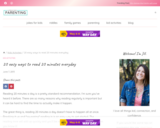
A fantastic article for parents and teachers that discusses the power of just 20 minutes a day for reading at home.
This is the best gift you can give your child!
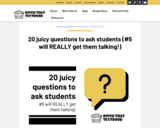
"A great question is a springboard into a fascinating discussion. Phrase it the right way and students will start thinking. Then they'll start talking. Then you won't be able to get them to stop!
Great questions can make the difference between a good learning activity and a great one."
This includes 20 questions as well as many ideas to make your own questions including - student interests, audio, images, video, would you rather, summaries, lists, fantasies, mysteries.

Find services for a variety of services IN YOUR AREA.
You can: call, text or web chat.
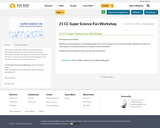
Powerpoint presentation:
Welcome and Introductions, Housekeeping items, Four Corners activity, Curriculum Information, Websites and Apps, So many hands on activities and demos, A couple of musical interludes, Feedback on the workshop, Thank you and safe travels home
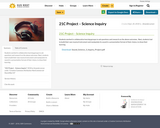
Students worked in collaborative learning groups to ask questions and research on the above outcomes. Next, students had to build their own musical instrument and manipulate its sound in a presentation format of their choice, to show their learning.

Skip counting is an important skill, one that leads kids naturally into multiplication. Kids can learn to skip count by rote, but they’ll get more value from seeing how the concept relates to real-life math. Try these activities and ideas to help make it happen!
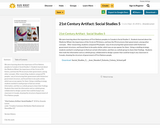
We were learning about the importance of First Nations peoples to Canada in Social Studies 5. Students learned about the Medicine Wheel, the importance of the Circle to FN history, and how the FN structures their government, among other concepts. After researching, students compared FN peoples` way of structuring their government with Hutterians` government structure, and found them to be quite similar, which was an eye opener for them. Using a retelling strategy, students worked in small groups to find out certain information, and then as a whole group to share their findings. Students then took the information and as a whole group, collaborated to design a poster that could be hung in any classroom in Canada, showing the structure of government of First Nations people.
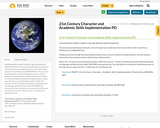
THIS RESOURCE IS DRAFT FORM! IT WILL BE UPDATED WHEN COMPLETE.
This professional development will walk a school through how to implement 21st Century Skills in their school from a SCHOOL and CLASSROOM level.
The group will work through the school implementation process and set a timeline for implementation, and then based on that timeline, the classroom teachers will plan their implementation.
Please note - the key to successful implementation is NOT time intensive - the key is introducing and then fully implementing the language and skills into your DAILY ROUTINES and classroom life. Once the skills are introduced it should become part of your day and not require set time - it will be part of everything you do!
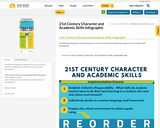
The following infographic outlines the process a school can take when establishing a program for 21st century skill development.
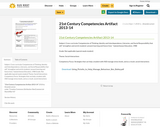
Subject: Cross-curricular Competencies of Thinking, Identity and Interdependence, Literacies, and Social Responsibility that will “strengthen and enrich students’ present learning and future lives.” Saskatchewan Education, 1988
Grade: Not applicable (special needs student)
Theme: Social Interactions
Competency Focus: Strategies that can help a student with ASD manage stress levels, and as a result, social interactions
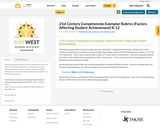
The following zipped folder contains example rubrics for each of the 7 Competencies (Character, Collaboration, Critical Thinking, Communication, Creativity, Computer & Digital Technologies, Cultural & Ethical Citizenship) for grades K-5, 6-9 and 10-12 grade level.
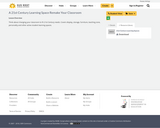
Think about changing your classroom to fit 21st Century needs. Covers display, storage, furniture, teaching zone, personality and other active student learning spaces.